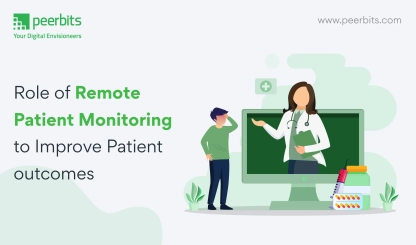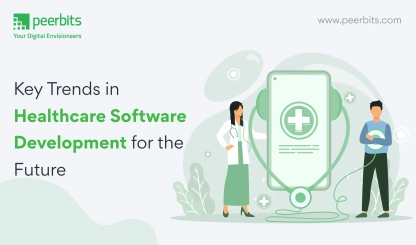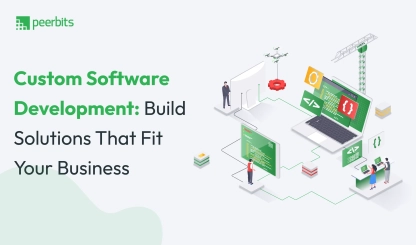Today, global businesses are competing with each other to gain a competitive advantage of minimizing cost, improving customer service, and maximizing efficiency.
Companies that focus on solid software development practices are excelling in today's competitive market. Adopting new technologies and efficient development processes, they are creating high-quality products, improving customer experiences, and fueling business growth.
These companies recognize that strong software is important for increasing efficiency, scaling operations, and achieving long-term success.
Companies gain huge benefits from IT software development outsourcing services. However, many stakeholders are skeptical about which industry gains better advantages from such practices. Before consulting an IT outsourcing company, get a solid understanding of how software outsourcing applies across industries.
This blog covers a detailed list of 10 premier industries that need software outsourcing services. We’ll also explore how the software outsourcing industry supports these sectors in optimizing operations.
Must-know statistics from the software outsourcing industry
Every year brings amazing opportunities for the software outsourcing industry and the same can be said for this year as well. Currently, outsourcing software development acts as a lifesaver for small and medium enterprises, startups, and for corporate players.
Even top-notch software development companies look for software outsourcing and the following data is a proof of it:
- As per Business Wire, the worldwide market of software outsourcing is estimated to reach $410.2 billion (approx.) by 2027.
- According to a survey by Deloitte, 70% of businesses prefer to go for software outsourcing to reduce their operational costs.
- As per Research and Markets, the IT outsourcing market is expected to grow at a CAGR of 4.12% during the forecast period from 2022 to 2026.
Hope you get a better understanding of software outsourcing market stats. Let us now dive into the industry verticals that are applying software outsourcing for a better market presence.
What is vertical software?
Vertical software refers to applications and systems crafted to meet the distinct needs of specific verticals in software industry or market segments.
Unlike general-purpose software designed for a wide audience, vertical software is customized to manage the specialized workflows and requirements unique to each field.
Examples include healthcare management systems, real estate platforms, and manufacturing software—each built to efficiently support industry-specific tasks.
Now that we understand what vertical software is, let’s explore its key characteristics that make it so effective for particular industries.
Key characteristics of vertical software
Vertical software includes specialized features line up with the demands of the industry it serves. For instance, in healthcare, vertical software might include electronic health records (EHRs) and telemedicine capabilities, while in real estate, it might focus on property management and customer relations.
This focus on industry needs helps businesses improve efficiency and compliance with sector regulations.
Benefits of vertical software
Here are the key benefits of vertical software:
- Industry-focused features: Designed with features specific to an industry’s needs, making it highly functional for particular workflows.
- Increased efficiency: Helps automate repetitive tasks, which saves time and reduces errors.
- Better compliance: Built to meet the regulatory requirements unique to each industry, easing the compliance process.
- Improved customer satisfaction: With tools and interfaces tailored for industry-specific use, vertical software provides a more user-friendly experience for employees and customers alike.
- Reduced training time: Since it aligns closely with industry practices, employees can adopt it faster and with less training.
Also Read: How to know software outsourcing is good for your business?
Top 10 Industry verticals benefiting from software outsourcing
Assigning software development to external agencies lets businesses focus on growth, marketing, and long-term strategies. The software outsourcing industry also aids in operational automation and faster deliveries.
Industries that need software development outsourcing services are diverse, with almost every sector benefiting from these services. In this blog, we will highlight the top 10 industry verticals for whom software outsourcing is especially advantageous.
1. Tech
Quick overview: Today, even big tech giants like Facebook, Google, and Amazon themselves can benefit from outsourcing their software needs to an outside provider.
Even startups like WhatsApp, Slack, GitHub, Alibaba, and Skype are some popular names that were built on the line of IT outsourcing software development.
Challenge: While technology allows many businesses to adapt during challenging times, there are still several IT issues to address as we look toward a future of technological success.
These issues include dealing with cyberattacks, information security concerns, challenges in implementing IT strategies, and bridging the widening skill gap in various verticals in IT industry and software industry verticals.
Solution: Some technological projects require professionals with specialized skill sets, or some may need additional assistance to complete tasks. The possibilities are vast in areas like healthcare, government, and finance, which can serve as stepping stones toward a new era.
Education, real estate, and insurance are prime contenders in the software outsourcing industry. These sectors often turn to third-party software development outsourcing service providers to meet their needs.
2. Healthcare

Quick overview: Undoubtedly, healthcare is one of the crucial industries across the globe. It is all about making people hale, hearty, and fine.
With a touch of innovation, the healthcare app development sector goes hand in hand with software outsourcing to manage the technical complexity.
Software development outsourcing plays a game-changing role in the healthcare industry verticals. As per Data Bridge, the healthcare app development market is expected to grow at a CAGR of 11% (approx.) between 2020 to 2027.
Software outsourcing supports the healthcare segment by equipping them with advanced cloud systems, robust analytics, clinical apps, patient portals, and other digital healthcare services.
Challenge: With lesser funds, reduced resources, and as the need for services grows — Facilities and professionals need reliable, efficient, and cost-effective technology for the healthcare industry that builds tools they need quickly without sacrificing quality. Fast and dependable solutions are needed to meet these requirements.
Solution: To tackle these challenges, software outsourcing in the healthcare industry provides access to specialized expertise and technology. Partnering with outsourcing providers helps healthcare organizations quickly develop custom solutions such as telemedicine platforms, EHR systems, and patient management apps.
Cloud-based systems offer flexibility for managing large data volumes while maintaining security. Integrating advanced analytics can improve decision-making and patient outcomes.
With the right partner, healthcare providers can meet their technology needs efficiently, optimize services, and deliver quality care on time and within budget.
3. Retail
Quick overview: Software outsourcing has empowered the retail industry by creating a great boom in it.
Challenge: The retail industry had to adapt quickly and shift a large portion of its operations online due to changing consumer behavior and increased demand for e-commerce.
This transformation was driven by factors such as technological advancements, growing consumer preference for convenience, and the need to offer contactless shopping experiences.
Solution: To address the challenges in the retail industry, businesses must adopt innovative solutions that improve customer experience, boost operational efficiency, and adapt to evolving market demands.
Here are key strategies to tackle these issues effectively.
- Optimize e-commerce platforms: Invest in scalable, user-friendly platforms with secure payment options for better online shopping experiences.
- Automate inventory and supply chains: Implement smart inventory management to reduce costs and improve efficiency.
- Personalize shopping: Use data analytics and AI to offer tailored recommendations and targeted marketing.
- Adapt to mobile commerce: Optimize websites for mobile and develop apps to enhance customer accessibility.
- Integrate contactless payments: Enable secure, fast transactions with digital payment systems.
- Implement omnichannel strategies: Create a smooth shopping experience across stores, websites, and apps.
4. Finance

Quick overview: When finance and technology joined hands, the result was FinTech. FinTech has improved the delivery of modernised digital finance services via futuristic and ultra modern mobile wallet apps, money transfer apps, finance mobile apps and interactive chatbots.
Even banking has also become seamless, with the inception of tech-savvy banking solutions.
Challenge: Financial service providers are often the soft target for the cybercriminals and fraudsters. The reason financial services get targeted more compared to other industries is that they carry too much sensitive user data.
As per Ciodive, the chances of a finance business getting hit is 300 times more than compared to any other business.
Financial services need to follow ample regulatory norms imposed by the government from time to time. And financial businesses are spending a heavy amount of money to ensure that they get compliant with these regulations and constantly changing industry standards.
Consumers frequently expect a detailed analysis of their spending habits and advice on financial management. Besides this, they are also interested in getting insurance as per their requirements.
Solution: Financial institutions have succeeded to a great extent in solving the above challenges by outsourcing a major chunk of their projects to software companies.
This cross-section of finance and software outsourcing holds a promising future for even more impactful innovations.
Here are some utilities that software outsourcing can provide to the finance sector:
- Domain-based finance apps and portals
- Payment gateway integrations
- Multilayer platforms with technical support
- Multi-currency support
So here is all about how software outsourcing is going to benefit the finance sector.
5. Transportation

Quick overview:
The travel industry entirely depends upon customized software services because the visibility of a hotel, resort, or travel destination solely depends upon the online presence.
Challenge: The transport industry is facing challenges due to shifting customer expectations, rising fuel costs, supply chain disruptions, and an increasing demand for eco-friendly transportation options.
Solution: Mobility solutions for the transportation industry is quite a complicated task. Here are some advanced ways in which software outsourcing is playing an important role in revolutionising the transport industry:
- Fuel-efficient technology: Shift to fuel-efficient and sustainable vehicles to cut fuel costs and support environmental goals.
- Enhanced customer experience: Use apps for real-time tracking, digital ticketing, and clear communication for convenience.
- Optimized supply chains: Employ logistics software to track shipments and reduce disruptions.
- Eco-friendly initiatives: Integrate electric or hybrid vehicles and optimize routes to lower emissions.
- Data-driven choices: Use analytics for cost-effective, efficient decision-making.
6. Food and beverages
Quick overview:
The food and beverage industry has had to undergo a lot of changes with their offerings. And the reasons behind this are changing food preferences, expectations, and behaviours in consumers.
Today, customers have become so discerning and sophisticated. They expect a great level of personalisation and safety when it comes to food.
Challenge: The industry has its challenges thanks to the perishable nature of the products, the necessity of complying with many regulations and risks posed by potential contamination and recall.
Apart from this, food and beverage businesses need to maintain fixed food temperatures, gain a better stock visibility, for ensuring streamline dispatches and packaging methods.
Solution: Software outsourcing helps the food and beverage industry meet key food safety compliance standards. Restaurant mobility solutions include features that support various aspects of the business.
These solutions offer food service management systems to keep operations smooth and menu management systems for easy updates. Kitchen management systems enhance workflow while food distribution management systems improve logistics.
Food safety management systems uphold quality standards, and ERP management systems support overall business integration. These tools work together to simplify operations and maintain high standards across the industry.
7. Logistics

Quick overview: The reason for the survival of the logistics industry over the past few years is all thanks to the technology that it utilizes and thereby evolving with time.
The latest technology has transformed the logistics industry. Today IT outsourcing companies and mobile development outsourcing can provide you with advanced fleet tracking systems that include advanced tools required by your business and customer needs.
Challenge: Technical complexities and ever-changing consumer demands have made the logistics and supply chain industry more competitive than ever. In addition to this, the logistics industry is also facing some other challenges that are as follows:
- Pressure to reduce transportation costs amidst fluctuating expenses
- Rising customer expectations for better service and faster deliveries
- Limited visibility and tracking across the supply chain, affecting planning and responsiveness
- Economic uncertainties that impact budgeting and operations
- Constantly evolving government regulations, requiring ongoing adjustments to compliance
Solution: Logistics app solutions provide effective strategies to address key challenges in the transportation industry.
They help reduce costs, improve visibility, improve customer satisfaction, and ensure compliance, making logistics operations more efficient and responsive to market demands.
- Cost optimization: Implement route optimization software and fuel management systems to reduce transportation costs and improve efficiency.
- Enhanced customer experience: Use real-time tracking apps and automated notifications to keep customers informed, meeting their expectations for timely deliveries.
- Improved supply chain visibility: Invest in IoT devices and cloud-based platforms for comprehensive, real-time monitoring of shipments across the supply chain.
- Financial resilience: Adopt flexible budgeting strategies and diversify suppliers to better navigate economic fluctuations.
- Regulatory compliance: Use compliance management software to stay updated on regulatory changes and automate compliance processes, reducing administrative burden.
8. E-Commerce
Quick overview: Software is critical for the e-commerce industry. Even the e-commerce segment often faces hurdles in the form of late deliveries, faulty discount codes and website crashes.
Challenge: User experience is the core of an e-commerce business. An essential part of user experience is the payment checkout process of an e-commerce platform. International and domestic payments are also considered as one of the roadblocks for an e-commerce business.
Solution: E-commerce retailers require specialized software outsourcing to automate backend processes and customer support. As businesses continue to shift online, they require innovative software that provides multiple capabilities.
These include smooth logistics services, consumer behavior analysis, better inventory management, faster checkouts, and accurate visitor tracking. This need is growing across various industry verticals, making software outsourcing in the industry verticals more important than ever.
9. Edtech

Quick overview: Edtech platforms are used to manage online lectures, student subscriptions, questions and quizzes, student tracking system, evaluation tools, etc. Coursera, edX, Udemy, upGrad, Teachable, etc. are some of the popular Edtech platform names.
Challenge:
Educational institutions are facing challenges as they adapt to digital platforms, striving to ensure that all students have equal access to technology.
Keeping students engaged in virtual environments has also proven difficult, as online formats often lack the interactive elements of traditional classrooms.
Teachers require training to bridge skill gaps in using new digital tools, while schools must prioritize data protection and cybersecurity to safeguard student information in these online systems.
Solution:
- Invest in complete digital tools and support systems that simplify online learning for students and staff.
- Provide subsidized or loaned devices and internet access to ensure all students can participate fully in digital learning.
- Use interactive, gamified learning platforms to keep students engaged and active in virtual classes.
- Organize regular training for teachers on the latest educational technologies and digital teaching methods.
- Implement strong cybersecurity protocols and secure data storage solutions to safeguard student information and prevent breaches.
10. Government
Quick overview: Every type of government, whether it is local, state or federal, requires extensive cybersecurity to protect its sensitive data.
Along with this, the government needs a technical edge to update its existing laws and jurisdictions by taking a ‘Smart’ approach via IoT Internet Of Things.
Challenge: Generally, the government sector approaches contracts based on the same old and rigid waterfall method to manage its projects. Unfortunately, the waterfall model leaves minimal space for shifting needs and priorities over the course of a project.
By the time the government is ready to find a solution, it’s likely already obsolete.
Solution: Technology boosts community development and growth. Because of this, governments across the world are gradually turning towards software development companies or partners that are capable of helping them with the segments in which they are lacking.
Also Read: How to choose the right outsourcing model for your business?
Why vertical software matter?

As industries grow more complex, the demand for specialized software continues to rise. Vertical software solutions help companies stay competitive by adapting to industry-specific trends and regulatory changes.
This focus on specialization lets businesses respond quickly to market demands and maintain a strong competitive edge.
How does software verticalization help with sales?
Software verticalization solutions to the specific needs of an industry, making them highly relevant and effective. When addressing unique workflows and challenges within verticals in the software industry—whether it’s healthcare, finance, or retail—sales teams find it easier to demonstrate value.
Clients see software that lines up with their operational needs and regulatory requirements, boosting trust and engagement.
Verticalized software also enhances market positioning, enabling sales teams to stand out from generic options by focusing on the specific needs of verticals in the IT industry.
This targeted focus helps sales teams present a solution that feels purpose-built for each client, increasing conversion rates and fostering long-term relationships. As industries evolve, clients value specialized solutions that grow alongside their changing demands.
Differences between vertical and horizontal SaaS: A quick comparison
When it comes to Software-as-a-Service (SaaS) solutions, businesses face a choice between vertical and horizontal models. Vertical SaaS solutions are customized for specific industries, providing specialized features, while horizontal SaaS products offer more general services that can be applied across a wide range of industries.
Understanding the key differences between the two can help businesses determine which solution best fits their needs. Below, we break down the main distinctions between vertical and horizontal SaaS.
| Aspect | Vertical SaaS | Horizontal SaaS |
|---|---|---|
| Target audience | Specific industries or niches | Broad market across multiple industries |
| Customization | Highly specialized and customized to the industry’s needs | More general-purpose with a focus on versatility across industries |
| Sales and marketing | Focuses on a specific sector, more personalized sales efforts | Wider sales approach with less specialization required |
| Product Features | Customized features and functions for industry-specific needs | General features that can be applied across industries |
Conclusion
Globalization and rapid market changes are reshaping industries in significant ways. As companies work to remain competitive in an interconnected world, software outsourcing has become critical for meeting growing customer demands and staying adaptable with technology, talent, and processes.
Businesses are increasingly motivated to partner with industry experts, seeking quality services that bring specialized expertise. Software outsourcing providers are now key players in helping companies optimize operations and drive growth.
If you're looking to outsource your software development, Peerbits is a reliable choice with a strong record of providing skilled developers and innovative software solutions to clients globally.

FAQs
Our team is skilled in collaborating with cross-functional stakeholders. We set up structured communication protocols and tools, making it easy for our team to work with yours across different departments and functions.
Yes, we offer post-launch support and maintenance, including troubleshooting, updates, and upgrades as required. This helps you keep your software running smoothly and aligned with evolving business needs.
We use KPIs (Key Performance Indicators) specific to your project—such as productivity, quality assurance, and time to delivery—to measure progress and report transparently. Regular reports keep you informed and help us stay accountable.
When you outsource software development, IP ownership can be a concern. We address this by including IP transfer clauses in our contracts, ensuring all code, designs, and documentation created for you remain your property from day one.
We use NDAs (Non-Disclosure Agreements) and stringent security protocols to protect sensitive data, ensuring only authorized team members have access. Additionally, we comply with international data security standards.
We conduct risk assessments during the planning phase and use project management tools to monitor timelines and milestones. This proactive approach helps us address potential issues early to prevent delays.
Our contract structure includes provisions for change management, so you’ll know the process and costs if project scope changes. We provide transparent budgets and work with you to control any additional expenses.
Compatibility with existing systems is a priority from the start. We assess your current IT infrastructure and create integration plans that ensure new software works seamlessly with legacy systems, reducing downtime and technical debt.








